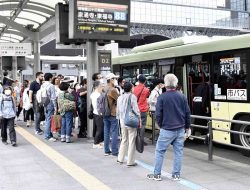New Project to Establish Youth Shelters Yet to Make Progress; Staff Shortages, Legal Hurdles Stymie Government Efforts

A woman, who once spent time at a private shelter, calls on suffering minors and young adults to find people they can rely on rather than worrying alone.
14:09 JST, December 21, 2024
The government-led project to create “youth shelters” to protect young people fleeing abuse and other problems has made no progress since being launched earlier this fiscal year, with not a single shelter having been established despite subsidies being offered to local governments. Many local governments have been hesitant to set up shelters, as they are not sure they would be able to ensure the safety of potential users.
The project was launched by the Children and Families Agency to provide shelter mainly for minors who have escaped abuse. The agency plans to soon draw up guidelines for the project’s implementation based on the opinions of an expert panel.
The agency defines a youth shelter as a facility where those aged 10 to 29 suffering from problems such as parental abuse can be accommodated for a period of several days to two months. Prefectures and government ordinance-designated cities are to set up such facilities, where staff will provide counseling and support to help users become self-reliant. Their operation may be outsourced to the private sector.
The project comes following a series of cases in which young people with no place to stay began gathering in shopping and entertainment areas in Tokyo and Osaka, leading to them becoming involved in crimes.
“We want to save young people who are in danger,” an agency official said.
Temporary custody facilities for minors seeking shelter are currently available at child consultation centers. However, some teenage students leave these facilities because of their strict rules, including restrictions on the use of smartphones.
In addition, as they are specifically aimed at those under 18 — the legal age of adulthood in Japan — it is difficult for them to accept young adults who are struggling with their relationships with their parents.
There are also some private shelters entrusted by child consultation centers with providing temporary custody. However, according to a survey by the Tokyo-based organization for the national network of children’s shelters, five of the roughly 25 member shelters in the network have suspended operations, mainly because of staff shortages.
Recognizing the need for new facilities to meet the needs of the times, the agency launched their project to set up shelters for minors and young adults this fiscal year.
The agency offers subsidies of ¥17.57 million per shelter, which can be increased to as much as ¥40.66 million if psychological counseling and support for employment and schooling are also provided.
However, this system is not being well-utilized by local governments. This is because there are many issues they would have to address to be able to run such shelters. As it is not a legally required facility, if they were to provide shelter for minors without parental consent, it could lead to problems.
Of the young people who seek shelter in such facilities, many are at risk of exposure to abuse, violence and sex trafficking. Therefore, in addition to ensuring that the shelter’s location remains confidential, the staff of such facilities are required to keep a close eye on the physical and mental conditions of the young people and any possible problematic behavior by them.
To counsel young people with complex backgrounds and help them become independent, it is best to assign staff with extensive experience in supporting such people. However, this is not easy, as even child consultation centers are struggling with a shortage of skilled employees.
To solve these issues and formulate guidelines for operating such shelters, the agency established an expert study panel in June.
“There are many young people who are not covered by the existing support framework, so it’s very important to establish shelters that can help them,” Atsushi Takahashi, a lawyer and member of the panel, said. “We want to thoroughly discuss this so we can resolve the issues and move forward with the project.”
The agency plans to use the panels’ opinions as a basis to formulate guidelines by the end of this fiscal year, and then encourage local governments to implement the project.
‘I met adults I could rely on’
Many young people have already been saved by private shelters.
One woman from the Kanto region, now 29, used a private shelter when she was 18 after having been abused by her parents.
“If it weren’t for that time, I don’t think I would be alive today,” she said. “At the shelter, I found out for the first time that there were adults I could rely on.”
When she was in elementary school, her mother remarried. When her mother gave birth to a second daughter, she began to be told things like, “I wish I had never given birth to you” and “Hurry up and die.”
When in fifth grade, her mother was hospitalized for an illness. For a month, her stepfather repeatedly sexually assaulted her while her younger sister slept.
In junior high school, she was bullied. She felt that she would never be loved by other people. In desperation, she turned to sex work while a high school student.
One day, she confided all these things to a teacher at school, who directed her to the Carillon Children Center social welfare corporation, where she met adults who were willing to listen to her and where she found a place to stay in peace.
“I felt that this was a warm, home-like atmosphere,” she said. During her two-month stay, she learned sewing and cooking and enjoyed physical exercise in the park. She decided to live independently.
She left home and worked in a hostess bar to make ends meet. She experienced a stillbirth and a divorce. Whenever she was in trouble, she consulted the shelter staff. That connection has saved her throughout the years.
She is now raising two children on her own while working as a driver for a nursing care facility and as an assistant for a childcare facility.
“I’m certain there are many children like me who have no place to stay. I want them to have someone to rely on, so they don’t have to worry alone,” the woman said.
Top Articles in Society
-

Producer Behind Pop Group XG Arrested for Cocaine Possession
-

Man Infected with Measles Reportedly Dined at Restaurant in Tokyo Station
-

Man Infected with Measles May Have Come in Contact with Many People in Tokyo, Went to Store, Restaurant Around When Symptoms Emerged
-

Woman with Measles Visited Hospital in Tokyo Multiple Times Before Being Diagnosed with Disease
-

Australian Woman Dies After Mishap on Ski Lift in Nagano Prefecture
JN ACCESS RANKING
-

Producer Behind Pop Group XG Arrested for Cocaine Possession
-

Japan PM Takaichi’s Cabinet Resigns en Masse
-

Man Infected with Measles Reportedly Dined at Restaurant in Tokyo Station
-

Israeli Ambassador to Japan Speaks about Japan’s Role in the Reconstruction of Gaza
-

Videos Plagiarized, Reposted with False Subtitles Claiming ‘Ryukyu Belongs to China’; Anti-China False Information Also Posted in Japan

























